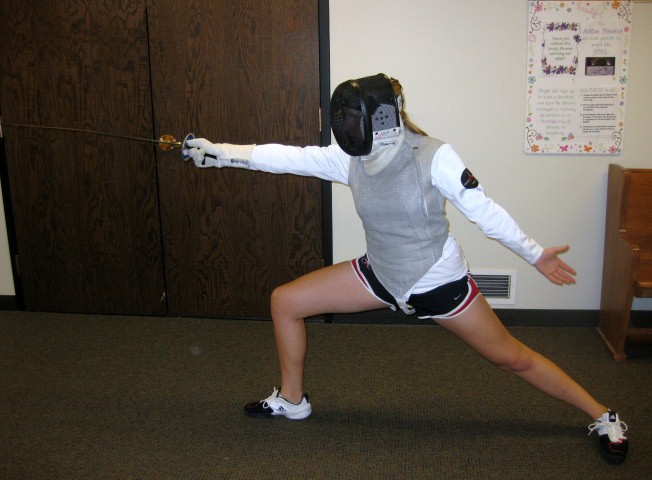Most students know the football, basketball, baseball, and soccer stars in the high school. But few know about a national fencing star who shares LZHS’s halls.
Only 25 sports are recognized at LZHS, but there are many other sports people choose to train and compete in. Fencing is one of the overlooked sports, but Grace Williams, freshman, works just as hard as any other varsity athlete.
Williams has been fencing for three years. Her mom encouraged her to start fencing when Williams was in sixth grade.
“My mom was talking about fencing one day because it was around the time of the Olympics, and I started to get into the idea of fencing,” Williams said. “I thought it would be cool, so I decided to try it considering I like to try new things.”
Williams is part of the Redstar fencing club in Chicago. She said she regularly travels downtown for training.
“My coach lives downtown in Chicago, so on the weekends or Thursdays I will go down to the fencing center there,” Williams said. “On Tuesdays, my coach comes down from Chicago to fence with all the suburban kids, like me, in Barrington at the YMCA.”
Along with practicing on a weekly basis, she competes in foil matches at both regional and national club hosted tournaments.
Most of the tournaments are in the fall and winter. But, the qualifying matches for Nationals are in May, and the actual national competition is in June or July, Williams said.
“I went to the national tournament last year in California and placed 81 out of about 150. The tournament is actually international because people from other countries come to compete,” Williams said. “There are usually 200 to 300 girls who compete in my division. But depending on how many fencers are signed up, there can be mixed divisions I can compete in too, which include both genders. There are many divisions depending on age and the type of swords that are used. This year I would like to improve and qualify for the national tournament again, which happens to be in Memphis, Tennessee.”
The distant tournaments force Williams to give up her personal time, but she said they are worth the sacrifice.
“There are more fencing tournaments than most people think. The good tournaments require fencers to travel more often though,” Williams said. “I have traveled to the East coast, California, Wisconsin, Saint Louis, and various other places for tournaments. The weekend of homecoming I had a fencing tournament. I got home late for the dance because the tournament was at Northwestern earlier in the day. Even though I give up my time for fencing, I have made friends while participating in this sport and enjoy it.”
Williams’ mom, Shannon Williams, enjoys watching her daughter fence because she is dedicated to her sport.
“I enjoy watching Grace fence because I see that her hard work and practice is all her own,” Shannon Williams said. “Her dedication is dictated by her own determination. While she is part of a team, it is ultimately Grace who is in charge of where she ends up.”
Even though she is dedicated to compete well in foil matches, there are two other swords, the épée, and sabre, Grace Williams said.
“I’ve never really explored those other two options, [épée, and sabre], because the foil is the most popular sword my club uses,” Williams said. “Also, épée or saber matches have different restrictions where a fencer can hit their opponent on an attack compared to the foil.”
Along with various swords, Williams said there is an abundance of equipment required to fence.
“I have a mask, chest protector, a plastron, which is like a shirt with one sleeve for your fencing arm. Then there’s a glove for your fencing hand,” Williams said. “I have a jacket that goes over everything on the top. And a lamé is the electrical part of the uniform on top of the fencing jacket that signals when the valid target area on the body has been hit. I also have a foil, the sword I compete with, knickers, long pants, and fencing shoes. You want light fencing shoes because you have to be quick on your feet. The shoes should have traction so you don’t slip, too.”
Equipment is only part of what Williams needs to compete in foil matches and accomplish goals in her future fencing career.
“I would like to fence in college. Some good fencing colleges are Northwestern, Princeton, Yale, Harvard, and other Ivy League schools. Their [fencing] teams are very good, but these schools are very hard to get into,” Williams said. “I am not sure where I will go, but I am willing to work hard to fence in college.”
Shannon Williams believes her daughter has the capability to fence in college and supports her daughter’s decision.
“I am not sure exactly what Grace would like to pursue as far as fencing at the collegiate level goes, I know she will first select a college that is a good fit for her,” Shannon Williams said. “Not many schools have division one fencing programs, but many do have club teams, so that is something she can choose to do.”
To succeed at the sport, Williams believes fencing requires certain qualities.
“I believe fencing is an art or looks like an art because when you watch it, it looks difficult,” Williams said. “You need to be strategic in order to think quickly to change pace, and you need to be strong. A lot of people don’t know it takes strength to hold your arm our straight for a long time with a sword that’s like a ten pound dumbbell. It takes a lot of power and finesse to fence.”

